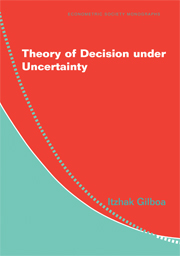IV - Cognitive Origins
Published online by Cambridge University Press: 05 January 2013
Summary
We made a rather long detour into theories of decision under uncertainty seeking a way to define subjective probabilities based on observed behavior. The idea was one of “reverse engineering”: observing behavior and inferring what beliefs might have induced it. Sadly, I have to admit that I do not view the project as a great success. This is not because the theories of decision under uncertainty that we have reviewed are flawed. In fact, I think that they are rather good theories. Expected utility maximization in general, and with subjective probabilities in particular, is not a bad approximation of actual behavior in many problems. Moreover, this theory provides compelling recommendations in an even wider array of problems. It may convince us that with the appropriate choice of the utility function, we need not take higher moments into account, nor consider other choice criteria. As long as we know what probabilities are, I believe that the theory is quite impressive.
However, when we do not know what the probabilities should be, I do not see that we have made much progress. In problems such as (3) and (4) in Chapter 1, we may find that our preferences are too ill defined, too incomplete, and too likely to violate other Savage's axioms in order to serve as a basis for the definition of probabilities.
- Type
- Chapter
- Information
- Theory of Decision under Uncertainty , pp. 171 - 172Publisher: Cambridge University PressPrint publication year: 2009



